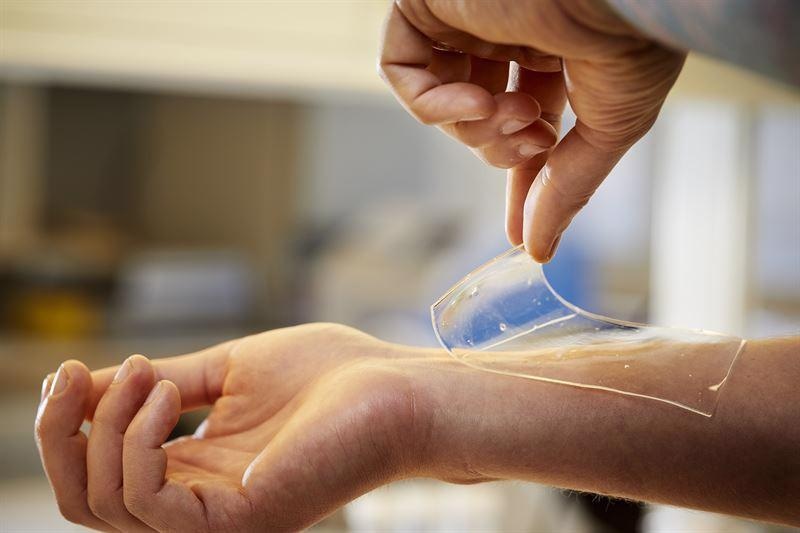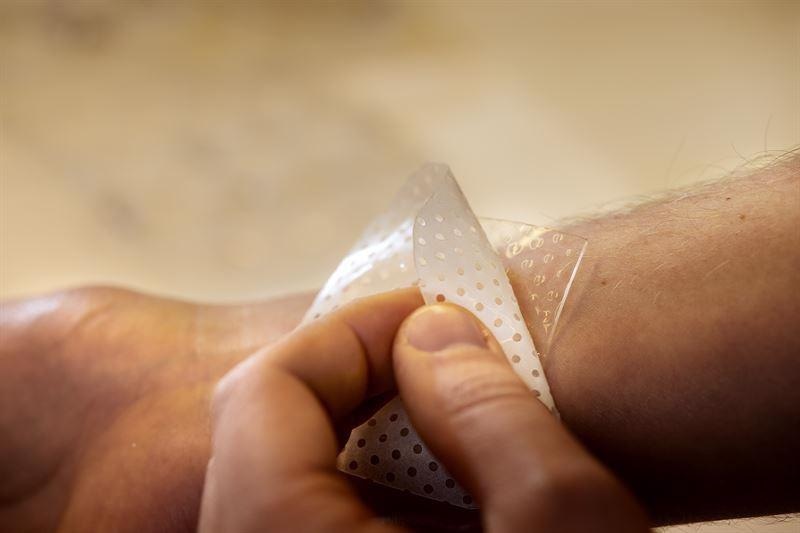
Image Credit: Anna-Lena Lundqvist/Chalmers University of Technology, Sweden
Antibiotic resistance is one of the biggest threats to global health. The manner in which antibiotics have been used in the past means that they are no longer effective and have become resistant to the bacteria they once fought.
In order to solve the problem, there needs to be a change in the way antibiotics are used, and novel, sustainable medical technologies must be established. A team at Chalmers University of Technology has engineered a new material that prevents wound infections and works against all types of bacteria, including antibiotic-resistant ones.
Antimicrobial Peptides
The new hydrogel has been developed over a number of years in the group of Martin Andersson, a professor in the Department of Chemistry and Chemical Engineering at the Swedish university. The key purpose of the research was to develop new medical technology solutions in order to lessen systemic antibiotic use with a particular focus on the possibilities for wound care.
Wounds are vulnerable to bacterial colonization and infection and despite their ineffectiveness, are initially treated with antibiotics. Infected wounds slow down healing and could make hospital-acquired infection – a life-threatening condition caused by bacterial resistance to antibiotics – more likely.
The active materials in the novel bactericidal material are antimicrobial peptides, which are small proteins that naturally occur in the immune system of humans, plants and animals which are unlikely to become resistant to bacteria.
“With these types of peptides, there is a very low risk for bacteria to develop resistance against them, since they only affect the outermost membrane of the bacteria,” explains Andersson. “That is perhaps the foremost reason why they are so interesting to work with.”
Researchers have tried to mimic the natural function of antimicrobial peptides to prevent and treat infections as an alternative to traditional antibiotics but without success. The peptides simply break down upon contact with bodily fluids like blood.
Andersson and his team knew that they would need a clever solution to protect the peptides from degrading; the result is a nanostructured hydrogel that creates a protective cocoon around the permanently bound peptides.
The hydrogel material is non-toxic and allows the peptide – in this case, RRPRPRPRPWWWW-NH2 (RRP9W4N) - to be directly applied to the skin to prevent infection and treat wounds and injuries on the body.
“The material is very promising. It is harmless to the body’s own cells and gentle on the skin,” says Edvin Blomstrand, a doctoral student at the Department of Chemistry and Chemical Engineering. “In our measurements, the protective effect of the hydrogel on the antimicrobial peptides is clear– the peptides degrade much slower when they are bound to it.”
The material was tested against Staphylococcus epidermidis, Staphylococcus aureus, Pseudomonas aeruginosa, methicillin-resistant S. aureus (MRSA), and multidrug-resistant Escherichia coli, exhibiting high antibacterial activity for up to 24 hours.
“After testing our new hydrogel on different types of bacteria, we observed a high level of effectiveness, including against those which have become resistant to antibiotics,” says Andersson. “We expected good results, but we were really positively surprised at quite how effective the material has proven.”

Image Credit: Anna-Lena Lundqvist/Chalmers University of Technology, Sweden
Clinical Trials and Commercialization
The material - which will benefit both hospitals and patients - is currently being developed as an antibacterial wound patch; it is undergoing clinical studies, and a CE marking is expected in 2022.
Unsurprisingly, the material has generated much interest and investment from around the world, and the researchers are working with spin-off company Amferia AB to bring the material to market. The company was founded by Andersson together with Saba Atefyekta and Anand Kumar Rajasekharan who were also involved in the work published in ACS Biomaterial Science and Engineering.
It is also in the midst of trials for treating pets within veterinary care. “Amferia has recently entered into a strategic partnership with Sweden’s largest distributor of premium medical & diagnostic devices to jointly launch these wound care products for the Swedish veterinary market during 2021” says Andersson.
References and Further Reading
Chalmers University of Technology (2021), New material to treat wounds can protect against resistant bacteria. News Cision: https://news.cision.com/chalmers/r/new-material-to-treat-wounds-can-protect-against-resistant-bacteria,c3344053. Accessed 18th May 2021
Atefyekta, S et al. (2021), Antimicrobial Peptide-Functionalized Mesoporous Hydrogels. ACS Biomaterial Science and Engineering: https://pubs.acs.org/doi/10.1021/acsbiomaterials.1c00029. Accessed 18th May 2021.
A couple of great pictures here: https://news.cision.com/chalmers/i/new-material-to-treat-wounds-,c2911394 and https://news.cision.com/chalmers/i/an-antibacterial-patch-,c2911395 – credit to Anna-Lena Lundqvist, Chalmers University of Technology
Disclaimer: The views expressed here are those of the author expressed in their private capacity and do not necessarily represent the views of AZoM.com Limited T/A AZoNetwork the owner and operator of this website. This disclaimer forms part of the Terms and conditions of use of this website.